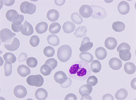

The translational research group in hematological neoplasms (GRETNHE) is a multidisciplinary group with the aim of characterizing different hematologic neoplasms at morphologic, phenotypic, cytogenetic and molecular levels. Among these, our research is divided in two main blocks: mature B cell neoplasms and myeloid neoplasms. The research performed within the group has a clear translational perspective, with special focus on the improvement of the daily management of the patients in routine laboratories.
The main area of interest is chronic lymphocytic leukemia (CLL) and monoclonal B cell lymphocytosis (MBL). During the last years, we have lead and participated in several multicentric projects within the Grupo Cooperativo Español de Citogenética Hematológica (GCECGH), Grupo Español de Leucemia Linfocítica Crónica (GELLC) and the European Research Initiative on CLL (ERIC) group that provided new insights in the cytogenomic abnormalities found in these entities.
At present, the main ongoing projects are focused on CLL patients with complex karyotype, associated with poor outcomes. We are working on two different areas:
In addition, the group is also performing studies related to the diagnostic and prognostic value of the expression of some proteins by immunohistochemistry, like LMO2, or other genetic lesions by FISH.


Our research group primarily focuses on myelodysplastic syndromes (MDS) and myelodysplastic/myeloproliferative neoplasms, such as chronic myelomonocytic leukemia (CMML). We have conducted comprehensive biological investigations-including morphological studies, genomic analysis, and flow cytometry-as well as clinical research to enhance diagnostic accuracy and prognostic assessment strategies.
Our recent scientific endeavors have been pivotal in identifying a distinct subset of myelodysplastic syndrome known as oligomonocytic chronic myelomonocytic leukemia (OM-CMML). This entity exhibits clinical, morphological, immunophenotypic, and genomic features akin to CMML yet divergent from other MDS subtypes.
These findings have influenced the redefinition of CMML in the updated WHO/ICC 2022 classifications, which now encompass OM-CMML, previously categorized under MDS. Current investigations aim to elucidate CMML characteristics on multiple fronts:
Besides, our group is highly committed with the incorporation of novel technologies in research, which will be ultimately transferred to the routine diagnosis. In this regard, we are working with several 12 -color flow cytometry panels.
Our team is also engaged in national and international initiatives to digitize cytological studies across various hematological malignancies, fostering advancements in digital pathology. In addition, we have implemented optical genome mapping (OGM), which has emerged as a promising technique that overcomes most of the limitations found in the classical cytogenomic methods. OGM was initially tested to assess genomic complexity in CLL patients and now it has been incorporated in routine management of other myeloid and lymphoid malignances. We are part of the International OGM Heme Working Group, which is involved in writing clinical guidelines for the implementation of OGM. We also lead the Spanish OGM working group within the Spanish Society of Hematology and Hematology, to create a forum for the coordinated implementation of the OGM among different national centers, as well as promote future research collaborations with OGM data.

NACIONAL NETWORKS: Sociedad Española de Hematología y Hemoterapia, Asociación Española contra el Cáncer, Grupo Español de Citología Hematológica, Grupo Cooperativo Español de Citogenética Hematológica, Grupo de Biología Molecular en Hematología, Grupo Español de LLC, Grupo Español de SMD.
INTERNACIONAL NETWORKS: American Society of Hematology, The Leukemia & Lymphoma Society, Myelodysplastic Syndromes Foundation, European Organization for Research and Treatment of Cancer, European Research Initiative on CLL, Eurogentest, European Society of Human Genetics, European Cytogeneticists Association, American Society of Human Genetics.
TOOLS OF INTEREST: The Atlas of Genetics and Cytogenetics in Oncology and Haematology, Recurrent Chromosome Aberrations in Cancer, Mitelman Database of Chromosome Aberrations in Cancer.
Coordinator:
Blanca Espinet(ELIMINAR)
Tel:
93 248 35 21
Fax:
93 248 32 54
Pg Marítim, 25-29
08003 Barcelona
© Institut Hospital del Mar
d'Investigacions MèdiquesLegal Notice and Privacy Policy | Cookie Policy | Site Index | Accessibility | Find Us | Contact